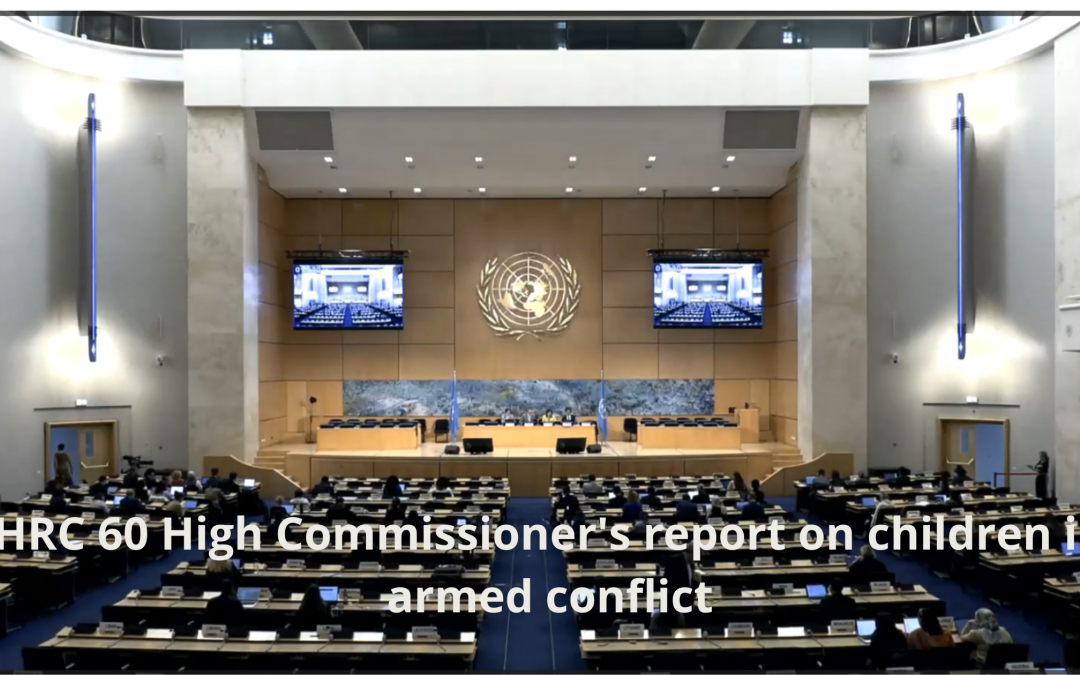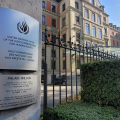In response to the call for input by the United Nations High Commissioner for Human Rights, the latest report on “The rights of the child and violations of the human rights of children in armed conflicts” has been presented for the 60th session of the Human Rights Council in September 2025. This report consolidates contributions from Member States, civil society, and subject matter experts following the High Commissioner’s invitation to share evidence and recommendations regarding the status and protection of children in situations of armed conflict. Further information about the context and the process can be found on the official UN call for input page: Call for Inputs: Rights of the Child and Violations of Human Rights of Children in Armed Conflicts.
Overview of the UN Report: Analysis by Country
The report documents widespread and recurrent violations of children’s rights in multiple armed conflict zones, providing a country-by-country breakdown of findings, patterns, and challenges.
Afghanistan
The report highlights that children in Afghanistan continue to face grave violations, particularly in the period following the change of government in 2021. Incidents of child recruitment and use by armed groups have been recorded, along with restrictions on girls’ access to education and healthcare. Increased insecurity and targeted attacks on educational institutions have affected children’s right to education. Arbitrary detentions of minors on suspicion of association with opposition groups have also been noted.
Syria
Children in Syria remain particularly vulnerable to violations amid ongoing hostilities and instability. The report notes incidents of child casualties and injuries resulting from airstrikes and artillery fire, as well as the continued recruitment of children by various armed factions. Access to humanitarian assistance, including food, medical care, and psychosocial support, remains severely limited in several parts of the country. Cases of arbitrary detention, sexual violence, and family separation are also reported, especially in displacement contexts.
Ukraine
Since the escalation of the conflict in early 2022, the report documents a substantial increase in violations against children in Ukraine. These include child casualties due to missile and artillery strikes in civilian-populated areas, forced displacement, and the disruption of access to education and healthcare. There are also documented instances of children being separated from families during mass evacuations and transfers, as well as concerns over illegal adoption and changes in children’s citizenship status.
Sudan
The ongoing conflict in Sudan has resulted in widespread displacement and direct attacks on children. The report notes increases in child abductions, sexual violence, and the recruitment and use of children by armed groups. Healthcare and educational infrastructure have been severely compromised, limiting access to essential services. The report also draws attention to the impact of food insecurity and malnutrition on children as a direct consequence of hostilities.
Yemen
In Yemen, ongoing armed conflict continues to have a devastating impact on children. The report identifies repeated attacks on schools and hospitals, with both airstrikes and ground fighting causing child casualties. The recruitment of children as combatants remains a key concern, as does the restriction of humanitarian access, which consequences in malnutrition, illness, and disruption of education for millions of children.
Myanmar
Children affected by conflict in Myanmar are reported to be at significant risk of exploitation, recruitment into armed forces, and arbitrary detention. Ethnic and religious minorities are disproportionately affected, and the report notes increased levels of displacement and separation from families. Continued disruptions to education, healthcare, and basic services exacerbate the plight of children caught in the conflict.
Democratic Republic of the Congo
In the Democratic Republic of the Congo (DRC), the recruitment and use of children by armed groups remain prevalent, particularly in the east of the country. Conflict-related sexual violence against children is also widely documented. The report notes a cycle of impunity, with limited access to justice for victims and insufficient support mechanisms for child survivors of violence.
Other Regions
The report also briefly covers situations in other countries, including Somalia, Burkina Faso, and Central African Republic, where patterns of violations repeatedly include recruitment, attacks on schools and hospitals, abductions, and conflict-related sexual violence.
Key Human Rights Violations Affecting Children in Armed Conflict
Across all contexts, the report identifies six grave violations against children as being of primary concern, consistent with UN Security Council definitions:
- Killing and maiming of children
- Recruitment and use of children by armed forces or groups
- Attacks on schools and hospitals
- Rape and other forms of sexual violence
- Abduction of children
- Denial of humanitarian access
The report stresses the compounding impact of these violations, highlighting that prolonged exposure to conflict severely hinders children’s access to education, health, and development opportunities. The psychological impact on children exposed to violence and displacement is also underlined.
The report concludes with a series of recommendations addressed to Member States, parties to conflicts, and the international community. These include:
- Strengthening Legal and Policy Frameworks:
Urges all States to ratify and fully implement the Convention on the Rights of the Child and its Optional Protocols, as well as to domesticate relevant provisions in domestic legislation. - Prevention and Protection Mechanisms:
Recommends that parties to conflicts adopt concrete measures to prevent the recruitment and use of children, ensure the immediate and unconditional release of children from armed forces or groups, and provide for their effective reintegration into society. - Ensuring Humanitarian Access:
Calls on all parties to allow unimpeded humanitarian access to populations in need, particularly to deliver essential services such as health care, education, nutrition, and psychosocial support to children affected by conflict. - Accountability and Justice:
Emphasizes the importance of investigating and prosecuting perpetrators of violations, strengthening national justice systems, and providing reparations and support for child victims of conflict. - Education and Support Services:
Highlights the need to ensure that children affected by armed conflict have continued access to education and are supported by targeted child protection services, including mental health and trauma care. - Data Collection and Monitoring:
Underlines the necessity for accurate data collection and monitoring of violations against children in conflict zones to inform policy responses and uphold accountability.
These recommendations are deemed crucial for the realization of the rights of the child and for mitigating the long-term impact of armed conflict on affected populations.
Contribution of CAP Liberté de Conscience
Sarah Thierré, a recognized expert on Syrian issues, contributed to the United Nations report on behalf of CAP Liberté de Conscience. Her analysis focused on the plight of children in Syria following the significant political and humanitarian developments in the country. Sarah’s contribution offered insights on obstacles to children’s access to protection and essential services, and emphasized the specific needs of child survivors in the post-conflict context. More on her expertise and contribution can be found here: Syria: Children’s rights at the heart of the issues after the fall of the Assad regime.





